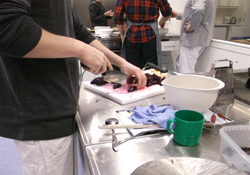Nutrition

Linda Kjær Minke/Syddansk Universitet
The quality and quantity of food available in a prison has a major influence on the quality of a prisoner’s life. The availability of safe and healthy food is essential in maintaining and improving prisoners’ health. Supporting and ensuring a safe and healthy food supply in prison will help to prevent diet-related diseases and promote better overall health of prisoners. Considerable benefits can be achieved when prison services work in a complementary manner to promote healthy lifestyles and facilitate healthy eating. These services include those for catering, education, health care, sports activities, treatment for substance users and activities of outside agencies.
Adequate nutrition should be considered one of prisoners’ basic human rights, especially as many have poor health. Healthy, nutritious meals will enable them to take their medication properly and prevent the development of life-threatening infections such as HIV/AIDS and tuberculosis. Also, vulnerable population groups in prisons – such as pregnant and breastfeeding women, substance users, teenagers and elderly people – have specific dietary requirements.
Prison systems in Member States in the WHO European Region differ in the way they provide food to prisoners. In most countries, the prison system provides food centrally and prisoners do not have to cook for themselves, although they may be able to prepare side dishes to the main meals.
Food provision in most prisons in Denmark is unique in that prisoners are responsible for buying and preparing their own food. Below is a short description of the food provision system in an average Danish prison.
Country example: Denmark
Renbaek is an open prison in southern Denmark. It has a capacity of 160 and all prisoners are male and sentenced. The prisoners have a right to occupation through work, education or other approved activity, including treatment possibilities. Prisoners involved in these activities receive a salary, part of which they have to use for purchasing food in the prison shop.
The prisoners in Renbaek choose, buy and prepare their own food. They have access to all necessary kitchen facilities in their living quarters and are responsible for preparing their own meals. The prison doctor and nurses can offer nutrition advice upon request or when prisoners enter the health care clinic with conditions that need nutritional intervention.
The joint cooking stimulates prisoners’ interaction and communication. Additionally, in Renbaek and other prisons in Denmark, the prisoners and prison staff eat their meals together, especially in treatment facilities, where treatment programmes include training prisoners in healthy eating and developing and maintaining positive social relationships. The collective dinner stimulates valuable interaction between prisoners and staff, including communication about food, nutrition and all other issues, in the informal setting of the dinner table.
The system in Renbaek reflects the concept of normalization: creating an environment where prisoners can live a life as similar as possible to that outside the prison.



